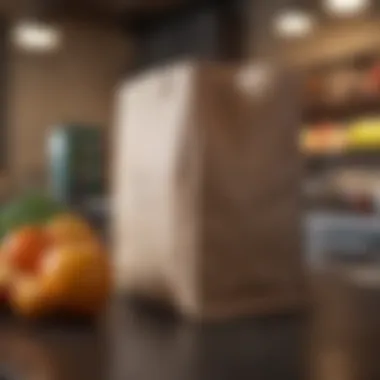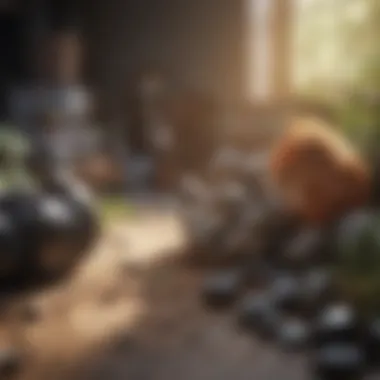Effective Ways to Reduce Plastic Usage at Home for Eco-Friendly Living


Nature Topic Overview
Plastic pollution is a critical environmental issue impacting our planet. As individuals, we have the power to make a difference by reducing plastic usage at home. This section will delve into practical and effective ways to minimize plastic waste, highlighting eco-friendly alternatives and sustainable practices that can be easily incorporated into daily routines.
Fun Facts and Trivia
Did you know that by 2050, there could be more plastic in the ocean than fish by weight? This startling fact emphasizes the urgency of reducing plastic usage. Additionally, plastic items like straws and plastic bags can take hundreds of years to decompose, causing long-lasting harm to the environment. Through engaging visuals and interactive elements, children can learn about the impact of plastic pollution and the importance of adopting eco-friendly practices.
Wildlife Explorations
Plastic pollution poses a significant threat to wildlife, with many animals mistaking plastic for food and suffering severe consequences. Sea turtles often mistake plastic bags for jellyfish, leading to ingestion and possible death. Interactive features like quizzes can educate children about the various species at risk due to plastic pollution, fostering a deeper understanding of environmental conservation.
Environmental Awareness
Conservation and sustainability are vital in combating plastic pollution. By reducing plastic usage, individuals can help protect natural habitats and wildlife. It is essential to instill a sense of responsibility in children towards environmental stewardship. Simple tips, such as using reusable water bottles and shopping bags, can make a substantial impact on minimizing plastic waste.
DIY Nature Activities
Encouraging children to engage in hands-on activities can enhance their appreciation for nature and the need for plastic reduction. DIY projects, such as creating bird feeders from recycled materials or building a compost bin for food waste, can ignite creativity and a sense of environmental responsibility. Outdoor explorations further reinforce the concepts learned, allowing children to apply their knowledge in real-world settings.
Introduction
Plastic pollution is a pressing global issue that demands immediate attention and action. In this comprehensive guide on reducing plastic at home, we delve deep into practical strategies and sustainable practices to make a significant impact on the environment. By understanding the detrimental effects of plastic pollution and embracing eco-friendly alternatives, individuals can play a crucial role in conserving our planet's natural resources. This article serves as a beacon of hope for those seeking to lower their ecological footprint and contribute to a greener, healthier Earth. Through a holistic approach, we aim to empower readers with the knowledge and tools necessary to bring about positive change within their households and beyond.
Understanding the Impact of Plastic Pollution
In this section, we delve into the critical topic of understanding the impact of plastic pollution. It is essential to comprehend the far-reaching effects of plastic waste on the environment to recognize the urgency of adopting eco-friendly practices. By shedding light on the environmental consequences of plastic, we aim to enlighten individuals about the gravity of the situation and motivate them to make sustainable changes in their daily lives.


Environmental Consequences of Plastic
- Pollution in Oceans: Pollution in oceans is a pressing issue linked with plastic usage. The vast amounts of plastic waste discarded into the oceans have detrimental effects on marine life and ecosystems. It disrupts the delicate balance of marine ecosystems, leading to widespread harm to aquatic organisms. The omnipresence of plastic in oceans not only harms marine animals but also poses a risk to human health through the consumption of contaminated seafood. Understanding the gravity of ocean pollution underscores the need for urgent action to curb plastic usage and disposal.
- Impact on Wildlife: The impact of plastic on wildlife is profound and concerning. Wildlife often mistake plastic items for food, leading to ingestion and entanglement, which can be fatal. This has devastating consequences on various species, disrupting food chains and endangering biodiversity. By comprehending the dire implications of plastic pollution on wildlife, individuals can realize the importance of responsible plastic management and conservation efforts.
- Microplastics in Food Chain: Microplastics, tiny plastic particles resulting from the breakdown of larger plastics, have infiltrated the food chain. They are consumed by aquatic organisms, eventually making their way into the human diet through seafood consumption. The presence of microplastics in the food chain raises health concerns due to potential toxic effects on human health. Recognizing the threat posed by microplastics underscores the necessity of reducing plastic usage to prevent further contamination of the food chain.
Practical Tips for Reducing Plastic Usage
In the quest to minimize plastic consumption at home, it is crucial to adopt practical tips that can make a significant impact. These strategies not only benefit the environment but also contribute to reducing one's ecological footprint. By embracing eco-friendly alternatives and sustainable practices, individuals can play a vital role in environmental conservation.
In the Kitchen
- Switch to Reusable Containers: Transitioning to reusable containers is a fundamental step towards reducing plastic waste. The concept of reusability inherently promotes sustainability by eliminating the need for single-use plastic items. By choosing durable, long-lasting containers, one can reduce reliance on disposable plastics, thereby fostering a more eco-conscious lifestyle.
- Avoid Single-Use Plastics: Steering clear of single-use plastics is essential in combating the plastic pollution crisis. Opting for reusable alternatives such as glass or stainless steel not only decreases plastic waste but also encourages a more mindful approach to consumption. By shunning single-use plastics, individuals can significantly lessen their environmental impact.
- Try Beeswax Wraps: Embracing beeswax wraps as a plastic wrap alternative presents a sustainable choice for preserving food. These wraps, crafted from beeswax-infused cloth, offer a reusable and biodegradable option for storing food items. By choosing beeswax wraps over traditional plastic wrap, individuals can reduce single-use plastic use and promote sustainable living.
In the Bathroom
- Choose Plastic-Free Toiletries: Opting for plastic-free toiletries is key to reducing plastic usage in the bathroom. By selecting items packaged in biodegradable or recyclable materials, individuals can minimize plastic waste generation. Making conscious choices when purchasing toiletries contributes to a cleaner environment and promotes eco-friendly habits.
- Use Bar Soap Instead of Bottles: Transitioning from liquid soap in plastic bottles to bar soap is a simple yet effective way to cut down on plastic usage. Bar soap typically comes with minimal or biodegradable packaging, reducing plastic waste significantly. This switch not only reduces one's plastic footprint but also promotes a more sustainable approach to personal hygiene.
- Switch to Bamboo Toothbrushes: Bamboo toothbrushes offer a sustainable alternative to conventional plastic toothbrushes. With biodegradable bamboo handles and BPA-free bristles, these toothbrushes are eco-friendly and easily compostable. By swapping to bamboo toothbrushes, individuals can incorporate an environmentally conscious choice into their daily routine.
For Shopping
- Bring Your Own Bags: Bringing reusable bags when shopping is a simple yet impactful way to curb plastic usage. By using sturdy, eco-friendly tote bags, individuals can avoid single-use plastic bags and contribute to reducing plastic pollution. Making a habit of carrying reusable bags reflects a commitment to sustainable practices and sets a positive example for others.
- Opt for Bulk Items: Opting for bulk items reduces the need for individually packaged products, thereby cutting down on plastic waste. Buying in bulk not only reduces plastic packaging but also often leads to cost savings and less frequent trips to the store. By purchasing in bulk, individuals can streamline their shopping process while making a sustainable choice.
- Shop at Zero-Waste Stores: Visiting zero-waste stores can introduce individuals to a range of package-free products and sustainable alternatives. Zero-waste stores offer goods without unnecessary packaging, allowing customers to refill containers and purchase items in eco-friendly ways. Shopping at zero-waste stores promotes a circular economy and encourages mindful consumption practices.
DIY Alternatives to Single-Use Plastics
In this section, we delve into the significance of DIY alternatives to single-use plastics within the context of reducing plastic waste at home. By choosing to create your own substitutes for single-use plastic items, you are taking a proactive step towards minimizing environmental impact while also promoting self-sufficiency. DIY alternatives not only help in reducing plastic consumption but also foster creativity and resourcefulness. Understanding the importance of DIY solutions empowers individuals to make conscious choices that align with sustainable living practices.
Homemade Cleaning Products
Vinegar-Based All-Purpose Cleaner
The vinegar-based all-purpose cleaner stands out as a pragmatic option in the realm of eco-friendly cleaning products. Its key feature lies in its natural composition, devoid of harsh chemicals often found in conventional cleaners. By utilizing vinegar's acidic properties, this cleaner efficiently tackles grime and bacteria while being gentle on surfaces and safe for the environment. Despite its strong odor, vinegar dissipates quickly, leaving behind a clean and sanitized space. The versatility and effectiveness of vinegar as a cleaning agent make it a preferred choice for those seeking eco-conscious alternatives for everyday cleaning tasks.


DIY Laundry Detergent
DIY laundry detergent offers a sustainable substitute to commercially produced detergents packaged in plastic containers. By blending simple ingredients like soap flakes, borax, and washing soda, you can create a cost-effective and eco-friendly detergent option. The key advantage of DIY laundry detergent lies in its customizable nature, allowing individuals to adjust the formula to suit their preferences and sensitivities. Although it may require slightly more effort to prepare compared to store-bought detergents, the benefits of reducing plastic waste and controlling chemical exposure outweigh the initial time investment.
Non-Toxic Air Fresheners
Non-toxic air fresheners provide a holistic approach to keeping living spaces fragrant without relying on synthetic fragrances contained in traditional air fresheners. These alternatives, often infused with natural essential oils or herbs, not only emit pleasant scents but also offer therapeutic benefits. The key essence of non-toxic air fresheners lies in their ability to improve indoor air quality without releasing harmful pollutants. While their scent longevity may vary compared to commercial air fresheners, the health and environmental advantages make them a preferred choice for individuals aiming to reduce plastic usage within their homes.
Handmade Personal Care Items
Delving into the realm of handmade personal care items unveils a realm of possibilities for those seeking to minimize plastic reliance in their daily routines. DIY shampoo bars serve as an innovative and sustainable replacement for liquid shampoos packaged in plastic bottles, combining cleansing agents with nourishing ingredients. The key attribute of DIY shampoo bars lies in their compact form, reducing packaging waste and promoting minimalistic living. Despite the adaptation period required for transitioning to solid shampoo, the benefits of sustainability and long-term cost-effectiveness render them an appealing option for eco-conscious individuals.
Natural Deodorant Recipes
Natural deodorant recipes present a chemical-free alternative to conventional deodorants contained in plastic tubes. By harnessing the antibacterial properties of ingredients like coconut oil and baking soda, these homemade deodorants offer odor protection without compromising skin health. The key allure of natural deodorant recipes lies in their transparency of ingredients, allowing users to avoid synthetic chemicals often present in commercial variants. While some individuals may experience an adjustment phase due to the absence of chemically-derived fragrances and preservatives, the long-term benefits of using natural deodorants make them a worthwhile choice for individuals committed to reducing their plastic footprint.
Homemade Lip Balms
Homemade lip balms emerge as a nourishing and planet-friendly alternative to conventional lip care products packaged in plastic tubes. By infusing natural oils, butters, and beeswax, individuals can create bespoke lip balms that cater to their specific preferences and needs. The key highlight of homemade lip balms lies in their ability to provide intense hydration without contributing to plastic waste accumulation. While the slight variations in texture and aroma compared to commercial lip balms may require an adaptation phase, the joy of crafting personalized lip care items and promoting sustainability adds a unique charm to incorporating homemade lip balms into one's daily routine.
Sustainable Habits for Plastic Reduction
When it comes to reducing plastic at home, developing sustainable habits is crucial. Sustainable habits for plastic reduction not only benefit the environment but also promote a more eco-friendly lifestyle. By incorporating these practices into daily routines, individuals can make a significant impact on decreasing plastic pollution. Consistent efforts in adopting sustainable habits lead to long-term benefits for the planet and future generations, aligning with the overarching goal of environmental conservation.
Meal Prep and Planning
Pack Lunches in Reusable Containers


Packaging lunches in reusable containers holds substantial importance in the realm of plastic reduction efforts. This practice eliminates the need for single-use plastic bags or food containers, thereby reducing unnecessary plastic waste. The versatility and durability of reusable containers make them a practical and sustainable choice for storing meals and snacks. In this article, the emphasis on packing lunches in reusable containers highlights a conscious effort towards minimizing plastic usage and promoting an eco-friendly lifestyle.
Avoid Single-Use Cutlery
Avoiding single-use cutlery is another essential aspect of plastic reduction strategies in daily life. By opting for reusable utensils instead of disposable plastic forks, spoons, and knives, individuals can significantly reduce plastic waste generated from single-use items. The enduring nature of reusable cutlery makes it a preferred option for those looking to diminish their plastic footprint. This section focuses on the significance of choosing sustainable cutlery alternatives to support the overarching goal of minimizing plastic consumption.
Plan Shopping Trips Wisely
Efficiently planning shopping trips plays a pivotal role in plastic reduction efforts at home. By creating a shopping list and avoiding impulsive purchases, individuals can lessen the amount of plastic packaging brought into their households. Thoughtful planning allows for selecting products with minimal or recyclable packaging, contributing to a more sustainable shopping experience. The strategic approach to shopping advocated in this article aims to cultivate mindful consumption habits and reduce plastic waste accumulation.
Composting and Recycling
Set Up a Compost Bin
Setting up a compost bin is a fundamental step towards environmental sustainability and plastic reduction. Composting organic waste minimizes the amount of trash that ends up in landfills, consequently decreasing the need for plastic trash bags. The nutrient-rich compost produced from kitchen scraps and yard waste can be used to enrich soil, creating a closed-loop system that benefits both gardens and the environment. This article delves into the benefits of composting and guides readers on establishing their own composting practices.
Sort Waste for Effective Recycling
Sorting waste for recycling is a proactive approach to managing household waste and reducing reliance on single-use plastics. Proper waste segregation ensures that recyclable materials are correctly processed, leading to a more efficient recycling system. By separating plastics, paper, glass, and metal items, individuals contribute to the sustainability of recycling processes and promote a circular economy. The section on sorting waste for effective recycling encourages readers to engage in responsible waste management practices for a cleaner and greener future.
Repurpose Plastic Packaging
Repurposing plastic packaging offers a creative solution to mitigate plastic waste accumulation and contribute to a circular economy model. Transforming old plastic containers, bottles, and bags into useful items or art projects prolongs their lifespan and reduces the demand for new plastic products. This innovative approach fosters a culture of upcycling and resourcefulness, showcasing the value of sustainability in everyday practices. By exploring creative ways to repurpose plastic packaging, individuals can actively participate in the fight against plastic pollution and cultivate a more eco-conscious mindset.
Engaging Kids in Plastic-Free Practices
Engaging children in plastic-free practices is crucial for fostering environmental awareness and sustainability values from a young age. By introducing eco-friendly concepts early on, children can develop a deep-rooted respect for the environment. It is imperative to educate children on the detrimental effects of plastic pollution and empower them to make conscious choices. Involving kids in plastic-free practices not only instills a sense of responsibility but also nurtures critical thinking skills and creativity. Through engaging children, we are shaping environmentally conscious future leaders and changemakers.
Educational Games and Activities
- DIY Eco-Friendly Crafts: In this section, DIY Eco-Friendly Crafts offer a hands-on approach to learning about sustainability and recycling. Children can create unique crafts using recycled materials, fostering creativity while promoting the importance of repurposing items. These crafts serve as tangible reminders of the impact of plastic on the environment, encouraging children to think creatively about waste reduction.
- Nature Scavenger Hunts: Nature Scavenger Hunts provide an interactive way for children to connect with the outdoors while learning about the ecosystem. By engaging in scavenger hunts, kids develop an appreciation for nature's beauty and learn firsthand the importance of protecting the environment. These hunts instill a sense of curiosity and environmental stewardship, nurturing a love for the planet.
- Plastic Pollution Story Books: Plastic Pollution Story Books engage children through storytelling, creating a platform to discuss complex environmental issues in a digestible manner. These books raise awareness about plastic pollution's impact on marine life and ecosystems, encouraging empathy and understanding in young readers. Through relatable characters and engaging narratives, children are inspired to take action in reducing plastic waste.
Involving Children in Eco-Friendly Choices
- Let Kids Choose Sustainable Products: Empowering children to choose sustainable products involves them in decision-making processes that align with eco-friendly values. By allowing kids to select environmentally conscious items, they learn the significance of sustainable consumer choices. This hands-on experience cultivates a sense of pride in making a difference and encourages long-term sustainable habits.
- Teach Them About Recycling: Educating children about recycling practices educates them on waste management and resource conservation. By teaching kids about the importance of sorting materials and recycling correctly, they gain insight into the circular economy. Understanding recycling enhances children's environmental literacy and equips them with practical skills to contribute positively to sustainability.
- Encourage Plastic-Free Lunches: Encouraging plastic-free lunches involves promoting waste-free alternatives and sustainable lunchbox options. By encouraging children to pack lunches using reusable containers and avoiding single-use plastics, parents instill eco-friendly habits. Plastic-free lunches not only reduce waste but also teach children the value of mindful consumption and respect for the environment.







